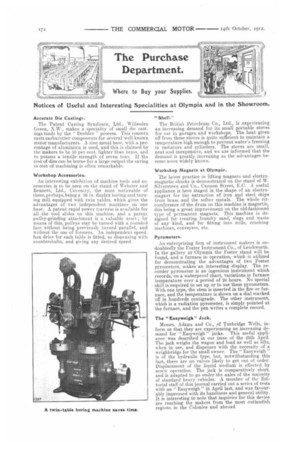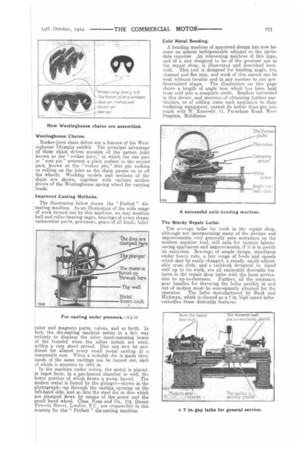The Purchase Department.
Page 18

Page 19

If you've noticed an error in this article please click here to report it so we can fix it.
Where to Buy your Supplies.
Notices of Useful and Interesting Specialities at Olympia and in the Showroom.
Accurate Die Castings.
The Patent Casting Syndicate, Ltd., Willesden Green, N.W., makes a speciality of small die castings made by the " Doehler " process. This concern casts carburetter components for several well-known motor manufacturers. A zinc metal base, with a percentage of aluminium is used, and this is claimed by the makers to be 10 per cent., lighter than brass, and to possess a tensile strength of seven tons, if the cost of dies can be borne for a large output the saving in cost of machining is often remarkable.
Workshop Accessories.
An interesting exhibition of machine tools and accessories is to be seen on the stand of Webster and Bennett, Ltd., Coventry, the most noticeable of these, perhaps, being a 36 in. duplex boring and turning mill equipped with twin tables, which gives the advantages of two independent machines on one base. A patent rapid power traverSe is available for all the tool slides on this machine, and a patent pulley-grinding attachment is a valuable asset ; by means of this, pulleys may be turned with a rounded face without being previously turned parallel, and without the use of formers. An independent speedbox drive for each table is fitted, so dispensing with countershafts, and giving any desired speed.
"Shell."
The British Petroleum Co., Ltd., is experiencing an increasing demand for its small portable stoves for use in garages and workshops. The heat given off from these stoves is quite sufficient to maintain a temperature high enough to prevent water's freezing in radiators and cylinders. The stoves are small, neat and inexpensive, and we are informed that the demand is greatly increasing as the advantages become more widely known.
Workshop Magnets at Olympia.
The latest practice in lifting magnets and electromagnetic chucks is demonstrated on the stand of W. Silversteen and Co., Cannon Street, E.C. A useful appliance is here staged in the shape of an electromagnet for the extraction of iron and steel chips from brass and the softer metals. The whole circumference of the drum on this machine is magnetic, this being a great improvement on the old-fashioned type of permanent magnets. This machine is designed for treating foundry sand, slags and waste of any kind, and for fitting into mills, crushing machines, conveyers, etc.
Pyrometers.
An enterprising firm of instrument makers is undoubtedly the Foster Instrument Co., of Letchworth. In the gallery at Olympia the Foster stand will be found, and a furnace in operation, which is utilized for demonstrating the advantages of two Foster pyrometers, makes an interesting display. The recorder pyrometer is an ingenious instrument which records, on a waterproof chart, variations in furnace temperature over a period of 24 hours. No special skill is required to set up or to use these pyrometers. With one type, the stem is inserted in the fire or furnace, and the temperature is shown on a dial marked off in hundreds centigrade. The other instrument, which is a radiation pyrometer, is simply pointed at the furnace, and the pen writes a complete record.
The "Easyweigh" Jack.
Messrs. Adams and Co., of Tunbridge Wells, inform us that they are experiencing an increasing demand for " Easyweigh" jacks. This useful appliance was described in our issue of the 25th April. The jack weighs the wagon and load as well as lifts, when in use, and dispenses with the necessity of a weighbridge for the small owner. The " Easyweigh " is of the hydraulic type, but, notwithstanding this fact, there are no valves likely to get out of order. Displacement of the liquid medium is effected by screw operation. The jack is comparatively short, and is adapted to go under the axles of the majority of standard heavy vehicles. A member of the Editorial staff of this journal carried out a series of tests with an "Easyweigh" in April last, and was favourably impressed with its handiness and general utility. It is interesting to note that inquiries for this device are reaching the makers from the most outlandish. regions in the Colonies and abroad. How Westinghouse chains are assembled. Westinghouse Chains.
Rocker-joint chain drives are a feature of the Westinghouse Olympia exhibit. The principal advantage of these chain drives consists of the patent joint known as the "rocker joint," in which the one part or "seat pin" presents a plain surface to the second part, known as the "rocker inn," this pin rocking or rolling on the joint as the chain passes on or off the wheels. Working models and •sections of the chain are shown, together with various motion drives of the Westinghouse spring wheel for varying loads.
Improved Casting Methods.
The illustration below shows the "Perfect " diecasting machine. As an illustration of the wide range of work turned out by this machine, we may mention ball and roller-bearing cages, bearings of every shape, carburetter parts, gearcases, gears of all kinds, lubri
cator and magneto parts, valves, and so forth. In fact, the die-casting machine seems in a fair way Pntirely to displace the older hand-ramming boxes of the foundry when the softer metals are used, within a very short period. Dies can now be prouced for almost every small metal casting at a easonable cost. When a suitable die is made thouands of the same castings can be turned out, each Of which is accurate to .0001 in.
In the machine under notice, the metal is placed, m ingot form, in a gas-heated chamber or well, the lower portion of which forms a pump barrel. The molten metal is forced by the plunger—shown in the Photograph—up through the casting opening on the left-hand side, and so into the steel die or dies which are clamped down by means of the screw and the small hand wheel, Chas. Neat and Co., 112, Queen Victoria Street, London. E C.. are responsible in this country for the " Perfect" die-casting machine.
Cold Metal Bending.
A bending machine of approved design has now become an almost indispensable adjunct to the up-todate repairer. An interesting machine of this type, and of a size designed to be of the greatest use in the repair shop, is illustrated and described herewith. This tool is designed for bending angle, tee, channel and flat iron, and work of this nature can be bent without trouble and in any number to any predetermined shape. The illustration on this page shows a length of angle iron which has been bent from cold into a complete circle. Readers interested in this device, and desirous of obtaining further particulars, or of adding some such appliance to their workshop equipment, cannot do better than get into touch with W. Kennedy. 11, Furzeham Road. West Drayton, Middlesex.
A successful cold-banding machine. The Sturdy Repair Lathe.
The average lathe for work in the repair shop, although not incorporating many of the devices and improvements very generally seen nowadays on the modern machine tool, still calls for various laboursaving appliances and improvements, if it is to justify its existence. Bearings of ample design, steadiness under heavy cuts, a fair range of feeds and speeds which may be easily changed, a steady, easily-adjustable cross slide, and a tailstock designed to stand well up to its work, are all eminently desirable features in the repair shop lathe with the least pretension to up-to-dateness.. Further, all the necessary gear handles for throwing the lathe quickly in and out of motion must be conveniently situated for the operator. The lathe manufactured by Buck and Hickman, which is classed as a 7 in. high-speed lathe. embodies these desirable features.






















